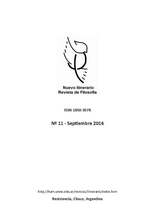Dialectics and Rhetoric in Arendt, or about the Socrates´s mistake
DOI:
https://doi.org/10.30972/nvt.0154010Keywords:
Dialectics, rhetoric, parrhesia, Socrates, ArendtAbstract
The present article analyses the relations between Dialectics and Rhetoric in Arendt, since the first chapter of The promise of Politics, and its relation with that the german writer understood like a Socrates´ mistake, when he expected to talk to his Judges, with a language methodology inappropriate for his objectives. Mostly, the analysis made by Arendt was focused in the classification of the Socrates´ speech, on the Apology of Socrates. The reason why is meaningful for us to recover her words, is certainly connected with a change of perspective and with an alteration of the provisional status assigned to Socrates, in a previous article titled Socrates and his relations with the four types of speech in the Antiquity. Symbols´ beginnings, that was got for object to analyse the connections between the speech classification of the Antiquity, since the Foucault´s perspective, and the Socratic speech, according to the registers of the Platonic Apology. The idea which guides the present article, therefore, consist of review how affects the worked by Arendt, in the sign of the parresiastic wich Socrates was identified with, since the foucaultianian reads, what today are necessary to reapprise through the Arendt´s contributions. By virtue of that, the work makes focus in the analysis on the first chapter of The promise of Politics, with references to the second chapter of the Life of Mind, however the resource to the others secondaries sources with efforts on the studied subject.
Downloads
Published
How to Cite
Issue
Section
License
Les autores ceden a Nuevo Itinerario los derechos de publicidad de sus trabajos, toda vez que hayan sido admitidos como parte de alguno de sus números. Ello no obstante, les autores retienen los derechos de propiedad intelectual y responsabilidad ética así como la posibilidad de dar difusión propia por los medios que consideren.












51.jpg)

